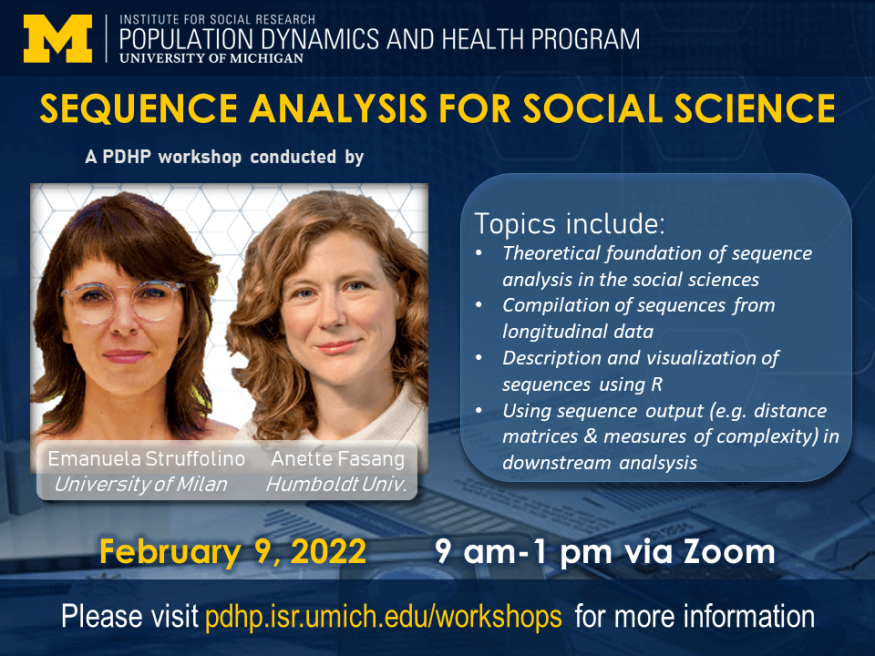Sequence Analysis for Social Science
Emanuela Struffolino and Anette Fasang
February 9, 2022, 9am-1pm

Please join as we kick off a new season of PDHP workshops, with a workshop entitled “Sequence Analysis for Social Science”, presented by Anette E. Fasang (Humboldt Universität zu Berlin) and Emanuela Struffolino (University of Milan). Sequence analysis, originally developed in biology to analyze strings of DNA, has attracted increasing attention in the social sciences as a key tool for using longitudinal data to analyze life course processes, including labor market careers, transitions to adulthood, and family formation. This workshop covers the theoretical foundation of sequence analysis, basic descriptive tools, as well as the general work-flow of sequence analysis. Hands-on examples using R will demonstrate the basic analytical steps using illustrative data on family and labor market trajectories.
Topics include:
- The theoretical foundation of sequence analysis in the social sciences
- Making informed choices when compiling sequences from a longitudinal dataset
- Description and visualization of sequences using R
- Using output from sequence analysis (e.g. distance matrices, measures of complexity) in further basic analysis (such as cluster analysis or regression)
Slides & Lab Materials:
Workshop slides available here
Sample Data and R code are available as a direct download and also via Dropbox
Software:
Demos for this workshop are conducted using R and rely upon the user installing a handful of specific R packages. A full install guide in PDF format is available for download.
––R software (required)
––R Studio (strongly recommended)
––R packages can be installed using the following code
# use (and install if necessary) pacman package if (!require("pacman")) install.packages("pacman") library(pacman) # load and install (if necessary) required packages for this course pacman::p_load(TraMineR, TraMineRextras, cluster, rio, plotrix, haven, Hmisc, gganimate, RColorBrewer, colorspace, knitr, kableExtra, reshape2, summarytools, vegan, MCMCpack, corrplot, ade4, cssTools, WeightedCluster, factoextra, tidyverse, effects, margins, psych, devtools, broom, nnet, descr, here, magrittr, glue, patchwork, pdftools,Cairo, OpenMx, grDevices, broomm, stats)
–-Graphviz (recommended)
References (optional additional reading):
- Abbott, A,. “Sequence Analysis: New Methods for Old Ideas.” Annual Review of Sociology, vol. 21, Annual Reviews, 1995, pp. 93-113, http://www.jstor.org/stable/2083405.
- Aisenbrey, S. and Fasang, A.E. (2010). New Life for Old Ideas: The ‘Second Wave’ of Sequence Analysis Bringing the ‘Course’ Back Into the Life Course. Sociological Methods & Research 38(3):420-462. doi:10.1177/0049124109357532.
- Piccarreta, R. and Studer, M. (2019). “Holistic Analysis of the Life Course: Methodological Challenges and New Perspectives.” Advances in Life Course Research 41 (online first). doi: 10.1016/j.alcr.2018.10.004
